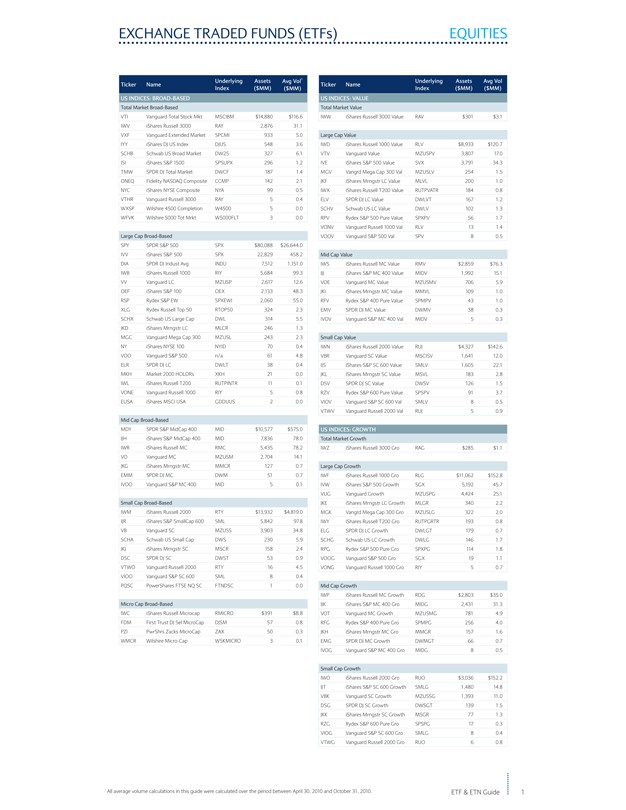This Tip Will Make You a Smarter ETF Investor (BLK BND GLD IAU SPY VTI VWO)
Post on: 30 Апрель, 2015 No Comment

Exchange-traded funds are one of the hottest investments around right now, and they can also be some of the best investments you can make. If you really want to make the most of ETFs in your portfolio, though, you need to understand why some ETFs are better than others, as well as some of the traps that many beginning ETF investors fall into.
Finding needles in a haystack
With hundreds of ETFs now available and new ones becoming available every day, finding the best ETFs for your needs might seem like an increasingly impossible task. Most investors, though, can build the ETF portfolio that meets their needs solely from ETFs that have existed for quite a while. The ongoing innovations in the ETF universe largely fall into two categories: duplicative offerings that already have existing ETFs that fulfill the same purpose, and niche offerings that will appeal only to a small number of investors.
This short series of articles will take a look at some of the factors that ETF investors need to pay attention to, and how some of the oldest ETFs in the market often serve investors better than more recent offerings. Today, we’ll start with the key to smart ETF investing: finding efficient ETFs.
Efficiency
The most important factor in investing generally is making sure that you invest efficiently. with a minimum of money lost to fees, commissions, and other costs. Nowhere is that more important than with ETFs, for two reasons: first, there are several layers of fees you may have to pay; and second, given that nearly all ETFs currenlty use index strategies, there’s little reason for you to pay high costs.
ETFs involve fees at several levels. ETFs typically charge an annual expense fee, ranging from just a few hundredths of a percent point to nearly 1%. If that doesn’t sound like much, consider: Blackrock ( NYSE: BLK ) saw its net income almost double during the second quarter thanks to its acquisition of the leading iShares line of ETFs from Barclays .
In addition, in order to buy an ETF, you need to purchase shares through a broker, which will in turn often charge you a commission to buy those shares. Finally, some ETFs hold investments that themselves have management fees and other costs that get passed on to ETF shareholders.
Some of the oldest, biggest ETFs have some of the lowest fees. SPDR Trust ( NYSE: SPY ). for instance, charges just 0.09% annually. Even in the higher-priced foreign stock ETF sector, Vanguard Emerging Markets ( NYSE: VWO ) has a low 0.27% expense ratio.
Sometimes, though, the best known ETF in a given space isn’t the cheapest. SPDR Gold Trust ( NYSE: GLD ). for instance, charges 0.40% versus just 0.25% for iShares Comex Gold ( NYSE: IAU ). even though the SPDR fund dwarfs the iShares fund in terms of net assets. The current price war among ETFs is leading some providers to undercut competitors by reducing fees.
Pay attention to trading costs
Even when you take those fund costs into account, there’s another that can make a big difference: the bid-ask spread. This spread refers to the difference between what you’d have to pay to buy shares versus what someone would pay you to buy them back from you. Especially if you anticipate trading ETFs actively, a high bid-ask spread can cost you a fortune. Again, though, the bigger, broader-based ETFs tend to have low bid-ask spreads. At Vanguard, for instance, Vanguard Total Bond ( NYSE: BND ) and Vanguard Total Stock ( NYSE: VTI ) have bid-ask spreads of 0.01% and 0.02% respectively, while one of its corporate bond ETFs sports a whopping 0.32% spread.
Another cost you need to remember is the commission you pay to your broker. Of course, depending on how much you invest, the $10 or less per trade you pay for trades may be negligible. But investors with more modest assets should look closely at the recent offers from Vanguard, Charles Schwab. and Fidelity to offer select groups of ETFs at no commissions to their customers. Depending on how much you plan to utilize ETFs, the money you save may well be significant.
Don’t miss out
Even if the hype that ETFs have received makes you wary, they’re still a valuable tool that most investors can use to enhance their overall portfolios. Tomorrow, we’ll look at another important thing that ETF investors need to focus on in making the best choices for their portfolios: diversification.
If you don’t own any ETFs yet, you don’t know what you’re missing. Foolish fund expert Amanda Kish has three new ETFs worth buying right out of the gate.
Fool contributor Dan Caplinger is still waiting for those Brainiac pills from the Jetsons for an instant IQ boost. He and the Fool own shares of Vanguard Emerging Markets Stock ETF. BlackRock is a Motley Fool Inside Value recommendation. Charles Schwab is a Motley Fool Stock Advisor pick. Try any of our Foolish newsletters today, free for 30 days. The Fool’s disclosure policy will never trade on an exchange but is still there 24/7 for you.














